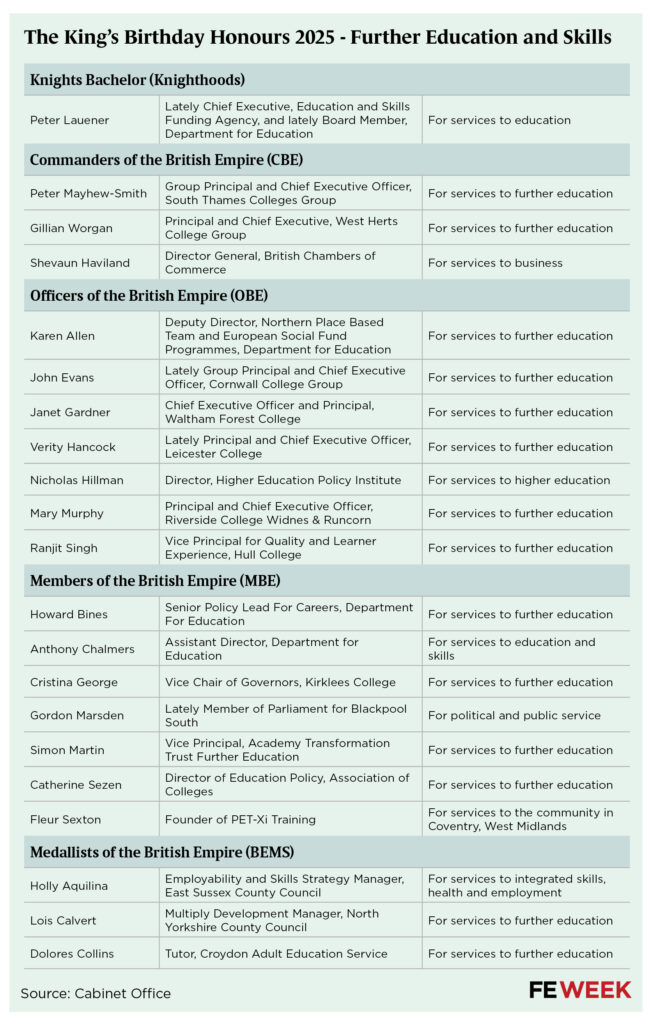An outdoor adventure lecturer, GCSE English tutor and sixth form law lecturer have been revealed as finalists for the Pearson National Teaching Awards further education lecturer of the year.
They are among 93 winners of silver awards, revealed today as part of National Thank a Teacher Day celebrations, who make up the shortlist for the gold awards that will be announced later this year.
Alongside the specific FE categories for lecturer of the year and team of the year, Lakes College principal and CEO Chris Nattress has won a silver award in the education-wide lifetime achievement category. Nattress is up against five other headteachers and education leaders for the gold award.
And lecturer Shona McFadyen, who teaches biology at The Corby Sixth Form, part of Bedford College Group, is up against six other silver award winners for the outstanding new teacher of the year award.
The exceptional teachers, support staff, teams and leaders from early years, primary, secondary, FE and SEND have been shortlisted from thousands of nominations and have been celebrated at special surprise celebrations in their schools and colleges this morning.
Education secretary Bridget Phillipson was among those congratulating the winners.
Phillipson said: “On Thank a Teacher Day, I want to celebrate the remarkable professionals who are the backbone of our education system.
“Teachers don’t just deliver lessons – they transform lives, inspire curiosity, and build the confidence our children need to succeed. For this incredible commitment to our nation’s future, we owe our teachers our deepest gratitude.”
The 93 silver award winners are now finalists for the gold award in their category. Gold awards will be announced at a glitzy ceremony later this year and in special features on BBC One’s The One Show.
Receiving their silver awards for FE lecturer of the year is Jess Day, outdoor adventure lecturer at Bedford College, Lisa Charles, lecturer at North East Surrey College of Technology, Neil McMullen, academic leader at New College Lanarkshire, Teresa Bellis, teacher of law at Thomas Rotherham College and Zamzam Ali, GCSE English lecturer at Loughborough College.
And the recognised FE teams of the year are Northampton College’s construction team, Gower College Swansea’s E-Sports team, Hopwood Hall College’s hair, beauty and catering team, Loughborough College’s sport team, Nottingham College’s personal social development team and South Gloucestershire and Stroud College’s ESOL team.
FE silver award winners in other education-wide categories include the digital team at Basingstoke College of Technology – up for the transformational use of digital technology award – and Cary Sawbridge, a programme leader from Sunderland College, who is up for the SEND and inclusive practice award.
Author Sir Michael Morpurgo, president of the Teaching Awards Trust, said: “The dedication and impact of those involved in educating young people is truly remarkable.
“I am delighted to be able to congratulate this year’s silver award winners. Your passion and commitment to shaping the next generation is extraordinary. Thank you for the difference you make every single day.”
The awards, and the Thank a Teacher Day campaign are organised by the Teaching Awards Trust and supported by Pearson.
Sharon Hague, CEO of Pearson UK, said: “Today, we proudly recognise those making an extraordinary impact. Our silver award winners represent the very best of the profession, and we’re thrilled to celebrate their dedication and achievements.”
Further education lecturer of the year
Jess Day, Lecturer in Outdoor Adventure, Bedford College
Lisa Charles, Lecturer, North East Surrey College of Technology
Neil McMullen, Academic Leader, New College Lanarkshire
Teresa Bellis, Teacher of Law, Thomas Rotherham College
Zamzam Ali, Lecturer in GCSE English, Loughborough College
Further education team of the year
Northampton College Construction Team, Northampton College
The E-sports Team, Gower College Swansea
The Hair, Beauty and Catering Team, Hopwood Hall College
The Loughborough College Sport Team, Loughborough College
The Personal Social Development (PSD) Team, Nottingham College
The SGS Life ESOL Team, South Gloucestershire and Stroud College
Lifetime Achievement
Carol Conway, Deputy Head, Greenfield Special School
Chris Nattress, Principal and CEO, Lakes College – West Cumbria
Lynn Griffiths, Headteacher, Ysgol Gymraeg Caerffili
Nicola Coe, Director of Maths, Inspiration Trust
Sean Frankcom, Director of Music, Burford School
Tracey Marquis, SENDCo, The Crest Academy
SEND and Inclusive Practice – supported by the Sunday Times
Abbot’s Lea School
Cary Sawbridge, Programme Leader, Sunderland College
Ian Bradley, Teacher of Mathematics, St Andrew’s College
The Your Future Programme, On Course South West (Plymouth City Council)
Trystan Wlliams, Executive Headteacher, E-ACT Venturers’ Academy
Outstanding New Teacher of the Year – supported by Sunday Times & DfE
Amy Hudspith, Teacher of Computing, Cramlington Learning Village
Emma Pallant, Year 1 Teacher, Wood Farm Primary School
Evie Askew, SEND Teacher, Mayfield School
Hannah Donnelly, Reception Class Teacher, Ernesettle Community School – Plymouth
Jordan Minor, Teacher, All Saints CofE VC Primary School
Sam Collard, Dance Teacher, Maths Teacher (ECT Y2) and Transition & Community Lead, Cedar Mount Academy
Shona McFadyen, Biology Lecturer, The Corby Sixth Form, Bedford College
Transformational Use of Digital Technology – supported by Nord Anglia Education
Joanne Stone, Trust Pedtech Leader, Kibworth CofE Primary School
Julie Carson, Director of Education, Knockhall Primary School
The Accessibility Team, The Oaks Specialist College
The DHSB IT Team, Devonport High School For Boys
The Digital Team, Basingstoke College of Technology
The Portsmouth: The Digital City Project Team as part of Portsmouth Education Partnership
Early Years Team of the Year Award
Banana Moon Day Nursery-Rothwell Early Years Team
Best Family Childcare Nursery Early Years Team
The Eden Early Childhood Centre Team
The Stanhope Primary School EY Team
Y Bont Early Years Team
Headteacher of the Year in a Primary School – supported by Hays Education
Dan Crossman, Headteacher, Marlborough St Mary’s CofE Primary School
James Parkinson, Primary Headteacher, De Lacy Primary School
Rizwana Mahmood-Ahmed MBE, Headteacher, Carlton Junior and Infant School
Simon Wood, Executive Headteacher, Sir Martin Froshiber Academy – Clacton-On-Sea
Stuart Mycroft, Headteacher, Castleway Primary School
Trudy Spillane, Principal, Drapers’ Maylands Primary School
Headteacher of the Year in a Secondary School – supported by Hays Education
Kathryn Pugh, Headteacher, The St Marylebone CofE School
Lucy Harrison, Headteacher, Archer Academy
Spencer Lewis, Executive Headteacher, Yavneh College
Making a Difference – Primary School of the Year
The Hindsford CofE Primary School Whole School Team, Hindsford CofE Primary School
The Queen’s Park Primary School Whole School Team, Queen’s Park Primary School
The Sprites Primary Academy Whole School Team, Sprites Primary Academy
The Tennyson Road Primary School Whole School Team, Tennyson Road Primary School
Making a Difference – Secondary School of the Year- supported by Step into Teaching
The Moor End Academy Whole School Team, Moor End Academy
The Clapton Girls’ Academy Whole School Team, Clapton Girls’ Academy
The Selly Park Girls’ School Whole School Team, Selly Park Girls’ School
The St Damian’s RC Science College Whole School Team, St Damian’s RC Science College
The Oldham Academy North Whole School Team, The Oldham Academy North
School or College Partnership of the Year – supported by Pixl
Manchester Post-16 Pathway Partnership
Shetland School/College Partnership Programme for S5/6 students
Sidcot School and the Extend Learning Academies Network (ELAN)
The James Montgomery Academy Trust
Windsor Olympus Academy
Teacher of the Year in a Primary School- supported by Randstad
Chris Leeding, Class Teacher, Newhall Primary Academy and Nursery
Gosia Watts, Class Teacher, Outwood Primary Academy Park Hill
Jack Huson, Assistant Headteacher, St Filumena’s Catholic Primary School
Jak Kirkman, Class Teacher / Music Lead, St Thomas’ CE Primary Academy
Lucie Tunnicliffe, Teacher, Springfield School
Mark Barnabas, Class Teacher, Trinity Academy Akroydon
Rachel Anderson, Assistant Headteacher & Year 6 class teacher, Wenlock CofE Junior School
Shaukat Ali, Deputy Headteacher & Year 5 Class Teacher, Marshfield Primary School
Sundip Bhambra, Year 1 Class Teacher and Year Group Leader, Minet Infant School Nursery Class
Zoe Turner, Assistant Head/Inclusion and KS1/EY lead & Class Teacher, Lordship Farm Primary School
Teacher of the Year in a Secondary School – supported by Nord Anglia Education
Carina Bone, Director of STEAM, Horris Hill School
Gemma Short, Science Lead, Octagon AP Academy
Jolie Bartley, Head of Performing Arts, Varndean School
Josh Bartle, Assistant Headteacher, Clifton Community School
Maria Riaz, Subject Leader of Business Studies & Head of Digital Faculty, Redden Court School
Mary Compton, Assistant Headteacher: STEM, The Hertfordshire & Essex High School and Science College
Penny Daniel, Teacher of English and Assistant Head of House, Churcher’s College Senior School
Suzanne Vickers, Associate Assistant Principal, Waterhead Academy
Teaching Assistant of the Year
Hardeep Bahra, Teaching Assistant (HLTA), St John’s Primary School
Lisa Grinney, Teaching and Learning Assistant, Tor Bridge Primary School
Nikki Wright, Teaching Assistant (TA), Packmoor Ormiston Academy
Shagufta Mirza, Higher Level Teaching Assistant, Carlton Junior and Infant School
Unsung Hero of the Year
Anna Hicks, Pastoral Lead – Family Support and Behaviour, Bannerman Road Community Academy
Jane Tonge, School Business Manager, The Divine Mercy Roman Catholic Primary School
Lee Smith, Site Manager, Hethersett Academy
Lisa McIntosh, Inclusion Manager/ Associate SLT, Trinity Academy Cathedral
Michele Toobe, Higher Level Teaching Assistant/ Lead Professional Teaching Partner/ Emotional Literacy Support Assistant/ School Governor Clerk, Castle Hill Primary School
Ruaidhrí Quinn, Class Teacher, St Patrick’s Primary School
Snowhal DeAraujo, Facilities Manager, Alperton Community School
Tom Guy, Sports Coach and Cover Supervisor, SS Mary and John CofE Primary School








